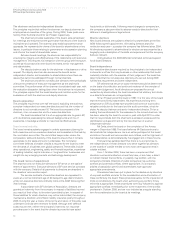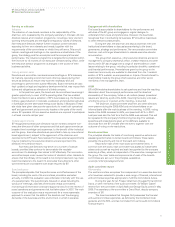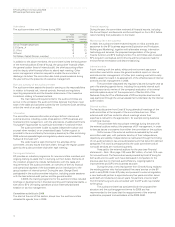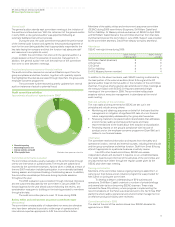BP 2008 Annual Report Download - page 81
Download and view the complete annual report
Please find page 81 of the 2008 BP annual report below. You can navigate through the pages in the report by either clicking on the pages listed below, or by using the keyword search tool below to find specific information within the annual report.
BP Annual Report and Accounts 2008
Directors’ remuneration report
Part 2 Executive directors’ remuneration
2008 remuneration
Salary increases
As part of our normal cycle, salaries were reviewed mid-year and were
increased to reflect market competitiveness and personal performance.
Dr Hayward’s salary was increased 10% to £1,045,000, and the other
executive directors by 6% to the following: Mr Conn £690,000, Dr Grote
$1,380,000 and Mr Inglis £690,000.
Annual bonus result
Performance measures and targets were set at the beginning of the year
based on the annual plan. The target level bonus of 120% of base salary
placed 50% on group financial and operating results including earnings
before interest, taxes, depreciation and amortization (EBITDA), cash
costs, cash flow, return on average capital employed (ROACE) and capital
expenditure. The remaining portion was weighted 25% on safety, 25%
on people and 20% on individual performance, principally operating
results and leadership.
Overall performance for 2008 was very strong and is more fully
set out in other parts of this report. Financial results exceeded targets for
EBITDA, free cash flow and returns on average capital employed, even
after adjusting for the high oil prices for part of the year. Cash costs were
managed below target, and capital expenditure within expected levels.
Operationally, the upstream business had an excellent year,
replacing a high proportion of proved reserves, exceeding its production
target and successfully starting up the important Thunder Horse
development in the Gulf of Mexico. The downstream business
successfully and safely completed the full re-commissioning of the Texas
City and Whiting refineries and improved overall performance. Alternative
Energy exceeded its targets for wind and met its solar sales target.
Safe and reliable operations remained at the top of the agenda
and performance, both in terms of safety metrics and progress on OMS
implementation, was assessed as satisfactory by the safety, ethics and
environment assurance committee (SEEAC). On the people front,
significant progress was made in reducing complexity and embedding a
performance culture throughout the group.
Annual bonus results for 2008 reflect this overall strong
performance and committed leadership and are set out in the table on
page 79.
2006-2008 share element result
Performance for the share element is assessed relative to the TSR of the
company compared with the other oil majors – ExxonMobil, Shell, Total and
Chevron. Recognizing the inherent imperfections in a TSR ranking, the EDIP
rules give the committee power to adjust (upwards or downwards) the
vesting level derived from the TSR ranking if it considers that the ranking
does not fairly reflect BP’s underlying business performance relative to the
comparators. This is designed to enable a more comprehensive review of
BP’s long-term performance, with the aims of tempering anomalies created
by relying solely on a formula-based approach.
For the 2006-2008 plan, BP was fifth relative to the other majors in
terms of TSR when calculated on a common currency (US dollar) basis as
originally anticipated. However, unusually large currency movements at
the end of this period were an extraneous influence on this result. On a
local currency basis, the TSRs of BP, Shell and Total were tightly bunched
together. The committee also reviewed BP’s underlying business
performance relative to the comparator companies over the full three-year
period. This review included financial measures (earning per share growth,
ROACE, free cash flow, net income), operating measures (production,
reserves replacement and Refining and Marketing profitability), and non-
financial measures (health, safety and environmental and reputation).
Again, the performance of the European comparators was quite similar:
BP led the group on some measures (notably free cash flow and reserves
replacement) but lagged on Refining and Marketing profitability.
The committee concluded that the TSR result, by itself, was not a fair
reflection of BP’s relative underlying performance over the period. After
thorough consideration, the committee determined that 15% of the
shares under the 2006-08 award should vest – this being a fair reflection
of the overall results achieved and consistent with its approach to the
clustering of results, as anticipated in the EDIP rules approved by
shareholders in 2005.
In accordance with its powers under the EDIP rules, the
committee also determined that, as there was clear evidence of a
progressive turnaround of performance over the final 18 months of the
performance period, individual vesting levels should only occur to the
extent that eligible individuals contributed to the turnaround. The resulting
final vesting for all eligible participants is shown in the table on page 83.
Mr Inglis’s award was made prior to his appointment as an
executive director under the MTPP (medium term performance plan) that
is the comparable plan to the EDIP. Vesting conditions were the same as
for the EDIP for Mr Inglis but, unlike the EDIP, the MTPP does not have a
three-year retention period.
Lord Browne also held an award under the 2006-08 share element
related to long-term leadership measures. These focused on sustaining
BP’s financial, strategic and organizational health. Performance relative to
the award was assessed by the chairman’s committee and, based on this
assessment, no shares were vested.
Remuneration policy
Our remuneration policy for executive directors aims to ensure there is a
clear link between the company’s purpose, its business plans and
executive reward, with pay varying with performance. In order to achieve
this, the policy is based on these key principles:
• The majority of executive remuneration will be linked to the
achievement of demanding performance targets, independently set
to support the creation of long-term shareholder value.
• The structure will reflect a fair system of reward for all the participants.
• The remuneration committee will determine the overall amount of
each component of remuneration, taking into account the success of
BP and the competitive environment.
• There will be a quantitative and qualitative assessment of
performance, with the remuneration committee making an informed
judgement within a framework approved by shareholders.
• Remuneration policy and practice will be as transparent as possible.
• Executives will develop a significant personal shareholding in order to
align their interests with those of shareholders.
• Pay and employment conditions elsewhere in the group will be taken
into account, especially in setting annual salary increases.
• The remuneration policy for executive directors will be reviewed
regularly, independently of executive management, and will set the
tone for the remuneration of other senior executives.
• The remuneration committee will actively seek to understand
shareholder preferences.
Executive directors’ total remuneration consists of salary, annual
bonus, long-term incentives, pensions and other benefits. The
remuneration committee reviews this structure regularly to ensure it is
achieving its aims. In 2008, over three-quarters of executive directors’
total potential remuneration was performance related. The same will be
true for total potential remuneration in 2009.
80
























